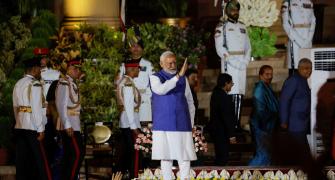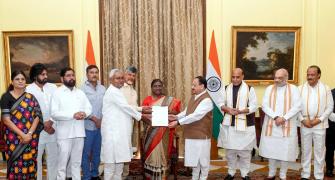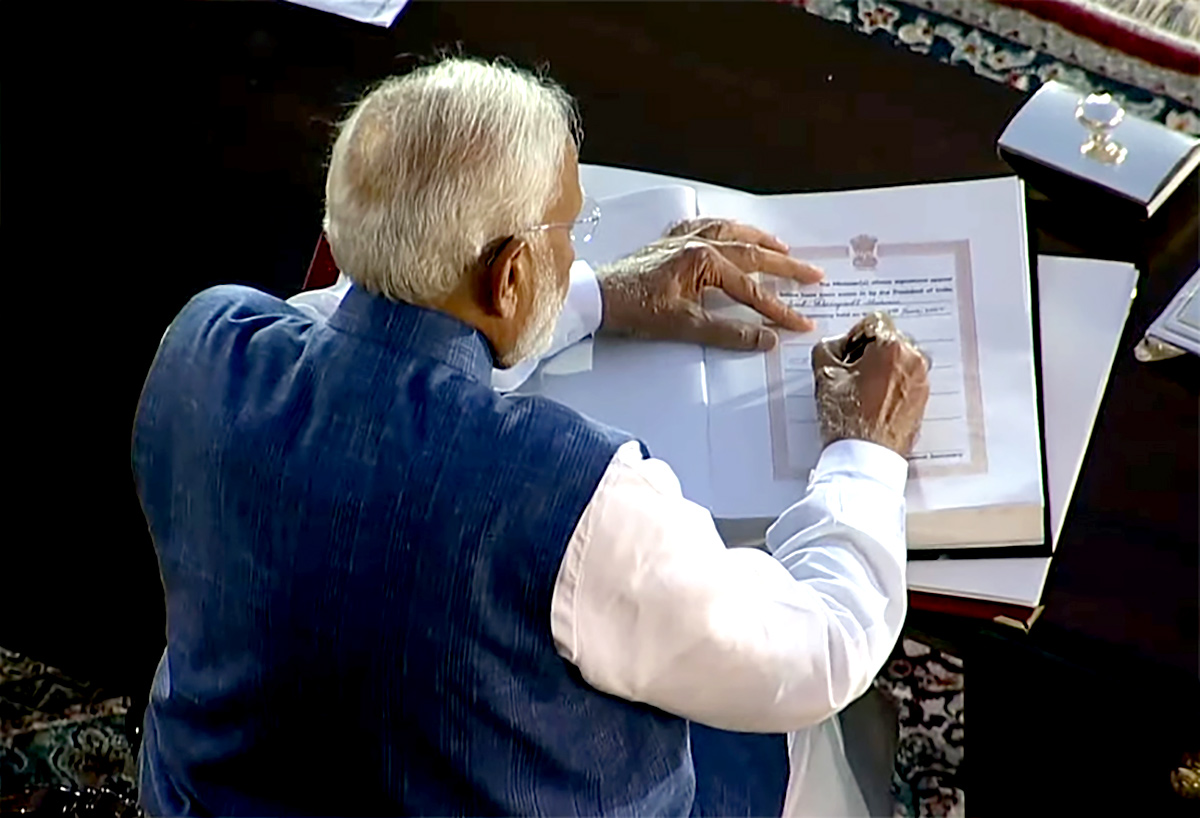If the concerns over risking political capital are overcome, the long-term gains for the Indian economy will be immense, asserts A K Bhattacharya.

With the electoral results indicating that the era of coalitions is back, the political economy debate in this country should once again be focused on the governance model that should be followed by the new regime at the Centre.
Even as a majority government, the Modi regime in its last two terms often promised a revamp of civil services to make the administration more efficient, governance restructuring to ensure that both the states and local governments become more effective, and factor-market reforms to increase the ease of doing business with simpler and more friendly laws on land, labour and the farm sector.
However, the strength of a single party majority notwithstanding, the outcome on all these fronts has not been encouraging. Will a coalition government in 2024, even if led by the BJP, deliver better results?
This is not because the Modi government did not have the political capital to carry out these far-reaching changes in the country's overall governance model.
No other government since Rajiv Gandhi's in 1985 has enjoyed such a clear singleparty majority in the lower house of Parliament.
It seemed that the BJP leadership was a little reluctant to risk its political capital for such economic reforms, and evidently focused more on its political agenda of rendering Article 370 inoperative in Jammu and Kashmir, or introducing the citizenship amendment law, or embarking on a highly disruptive plan like demonetisation.
When it came to hard economic reforms like rationalising the multiple rates under the goods and services tax regime, or privatising non-strategic state-owned enterprises, for which even a policy had been approved, there was hardly any progress.
Air India figures as the only case of privatisation under Mr Modi's 10 years of rule at the Centre.

To be fair, the Modi government did succeed with many reforms, like the setting up of an inflation targeting monetary policy regime with the help of the Reserve Bank of India, launching an insolvency and bankruptcy resolution system, introducing GST all over the country, creating a regulatory system for the real estate sector, and improving the digital public infrastructure to deliver benefits to citizens across states.
It also tried to reform land, labour and farm laws. However, the laws regarding labour and the farm sector met with stiff political resistance and even a majority government like that of Mr Modi decided to roll them back.
On labour law reforms, the simplified four labour codes were passed by Parliament, but the Centre has so far failed to get all the states on board.
If Mr Modi begins his third successive term as prime minister, but only as the head of a coalition, what are the chances that any of these long-pending economic reforms will be implemented? Sadly, the BJP's election manifesto, released before the 2024 general elections began, offers little hope.
The manifesto makes no mention of reforms of land and farm sector laws, which had to be rolled back in Mr Modi's first and second terms, respectively.
On labour law reforms, there is no indication if the newly elected government would renew efforts at bringing sections of trade unions that are still opposed to the changes and persuading all the states to come on board to enforce the new codes.
Worse, with the government critically dependent on its coalition partners for survival, it may not embark on such reforms.
In the past, coalition governments have been able to bring about such reforms only when the economy is facing severe constraints.
There is no such crisis at present for a coalition government to push for such reforms.
It is, of course, not necessary that the new government cannot implement these basic factor-market reforms if these are not part of the BJP's election manifesto.
It can implement them even without the support of the manifesto, provided there is a solid performance-oriented team of ministers who could show the political resolve and economic intent to carry out these reforms.
The BJP manifesto talks about making India a global hub for almost a dozen industries like food-processing, defence, railways, aviation, ship-building, pharmaceuticals, electronics, semiconductors, automobiles, electric vehicles, strategic minerals, textiles and diamonds.
If such investment ambitions have to be realised, the Modi government in its third term needs to have ministers in charge of industrial development, who should embark on land and labour reforms, push for early enforcement of labour codes, and take advantage of fresh reforms in taxation laws, which incidentally has been promised in the manifesto.
That path is likely to yield better results, instead of pursuing import substitution goals with the help of higher tariffs and relying on government subsidies that drain the central exchequer's resources. But chances of such reforms from a coalition government will once again be remote.
There is no gainsaying that such reforms will be critical for the economy.
India's buoyant economic growth in the last three years has been largely supported by a massive investment in infrastructure by the government.
Economic growth in the coming years can be sustained at a decent level only if the pace of investment from the private sector picks up. And reforms that improve the ease of doing business in the country can certainly help revive such private sector investment.
At the same time, this strategy could free up the government's resources, now being used for infrastructure investment, and help reduce its borrowing and fiscal deficit.
That should also lead to a moderation in the cost of borrowing by the private sector.
Thus, factor-market reforms are critical for sustained growth of the economy. But once again will a coalition have any appetite for such reforms?

There are two other areas where the governance model of the new regime at the Centre deserves to get better.
The Indian Administrative Service now has a complete stranglehold on the government system, and that powerful grip has to be dismantled.
Of course, in the last few years, the number of non-IAS officers has increased in higher echelons of the civil service, but this process has to be institutionalised.
There is a need for more officers with specific domain expertise, who could be in charge of leading important ministries.
That process should be continued and the new government could consider reviving an institution like the Industrial Management Pool, launched in 1957 to facilitate the entry of managers from private and public sector units into the government.
This system produced some of India's better managers in the government. Even the pool of economists and technocrats that once strengthened the government has now dried up and is in dire need of a revival.
The second imperative pertains to the way the second and the third tier of governance need to be beefed up.
The BJP manifesto has promised greater fiscal autonomy for local governments.
If this promise has to be fulfilled, the Centre and the states have to join hands in empowering the panchayats and urban local bodies.
There are many intricate legislative issues that need to be addressed so that the states are made to devolve financial and non-financial powers to local governments.
To begin with, the new government should set up a committee with all states as its members and entrust it with the task of formulating a way forward.
A collaborative approach involving the states in not only framing the new model of governance but also in sustaining the investment momentum would be helpful.
Prime Minister Narendra Modi is not unaware of the need for such a collaborative approach, as was evident in some of his recent media interviews during the just-concluded elections.
Perhaps a coalition can put more pressure on the prime minister to adopt a genuine approach towards cooperative federalism, which can help eliminate many of the strains that marked the relationship between the Centre and the states during the last decade.
The agenda for governance reforms in the coming five years is not going to be easy to implement. But if the concerns over risking political capital are overcome, a consensus on reforms can be built among the coalition partners.
Most importantly, a coalition structure can make the new government more open to heeding other views, and the long-term gains for the Indian economy will be immense.
Disclaimer: These are A K Bhattacharya's personal views.
Feature Presentation: Rajesh Alva/Rediff.com











